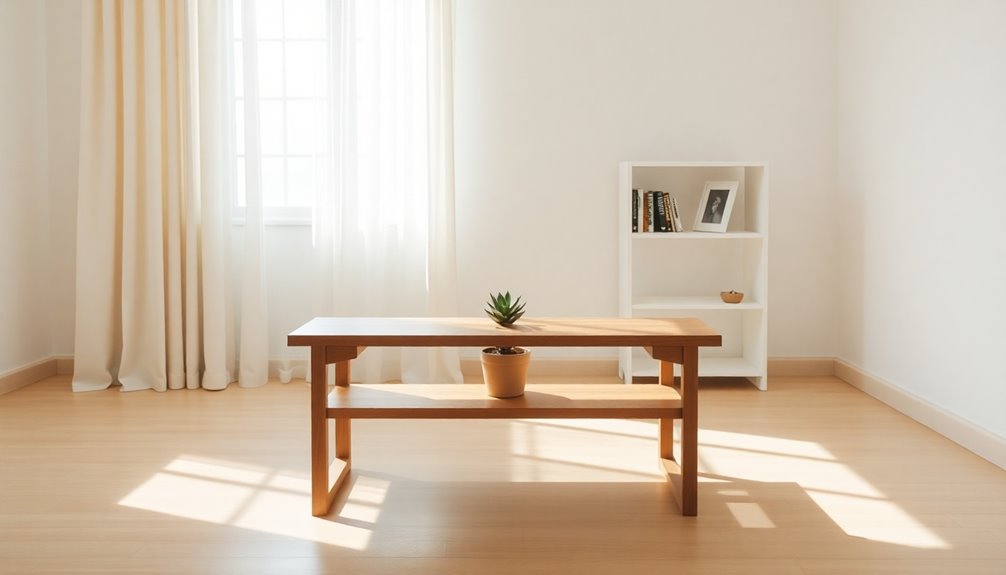To start living with less, first, understand your clutter and what it means to you. Set clear intentions, like reducing stress or creating a welcoming home. Engage with supportive communities and gather insights from minimalism resources. Break down the process into manageable steps—tackle small areas, use a timer, and categorize items. Celebrate your progress, no matter how small, to stay motivated. Keep going, and you'll discover more practical tips and strategies to simplify your life.
Key Takeaways
- Identify your motivations for decluttering, such as reducing stress or creating a more organized space.
- Start small by focusing on manageable areas and setting a timer for efficient sorting.
- Challenge emotional attachments by regularly evaluating possessions and addressing "I Might Need That" thinking.
- Establish a support network through online communities or friends to share experiences and maintain accountability.
- Celebrate your progress by documenting changes and reflecting on the benefits of living with less.
Understanding Your Clutter

When it comes to understanding your clutter, it's essential to recognize that many people struggle with emotional attachments to their belongings. These items often hold personal significance that complicates your decision to let go.
By evaluating your possessions regularly, you can identify the things that matter most and simplify your life. Challenge the "I Might Need That" mentality to remove unnecessary items and reduce clutter.
Regularly assess your belongings to discover what truly matters and embrace a simpler, clutter-free life.
Pay attention to emotional hotspots where sentimental value accumulates; addressing these feelings can make decluttering easier. Remember, a job half done can lead to lingering clutter, so commit to thorough efforts.
Living with less not only creates a more organized space but also frees you from emotional burdens tied to your belongings. Additionally, many individuals find that decluttering can help alleviate cognitive decline by creating a more calming environment.
Setting Intentions for Decluttering
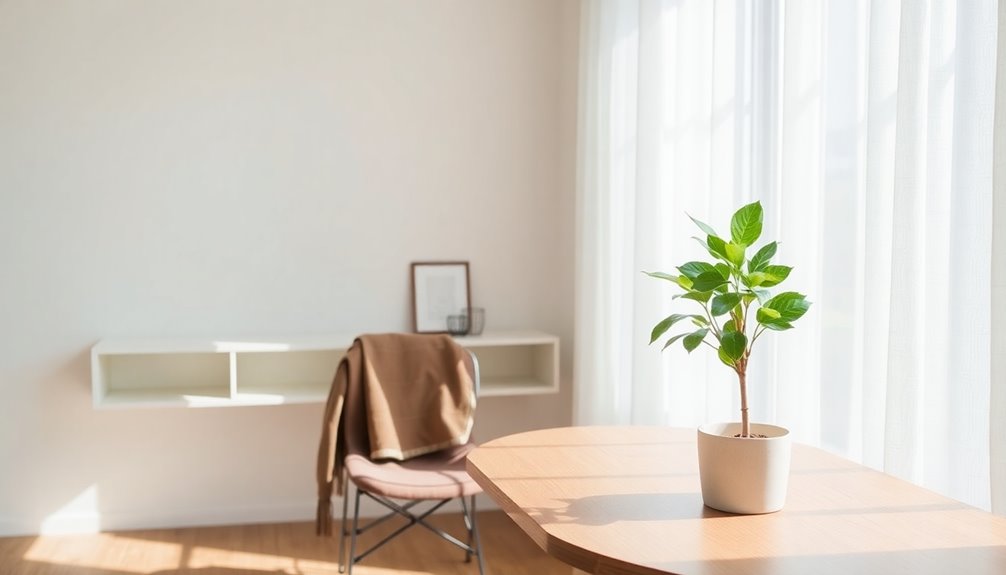
After reflecting on your clutter and the emotional ties that come with it, the next step is to set clear intentions for your decluttering journey.
Start by identifying your personal motivations, like reducing stress or creating a welcoming home. Reflecting on what you want to make room for—be it family time, hobbies, or mental clarity—will help you let go of unnecessary items.
Write down specific goals, such as decluttering one room per week or donating a set number of items monthly, to establish measurable benchmarks. Incorporate regular check-ins to revisit your intentions, keeping your focus sharp.
Sharing your goals with friends or family can create a supportive environment, fostering accountability and making the process feel more manageable. Additionally, consider setting up an emergency fund to cushion any financial impacts that may arise from your decluttering efforts.
Creating a Support Network
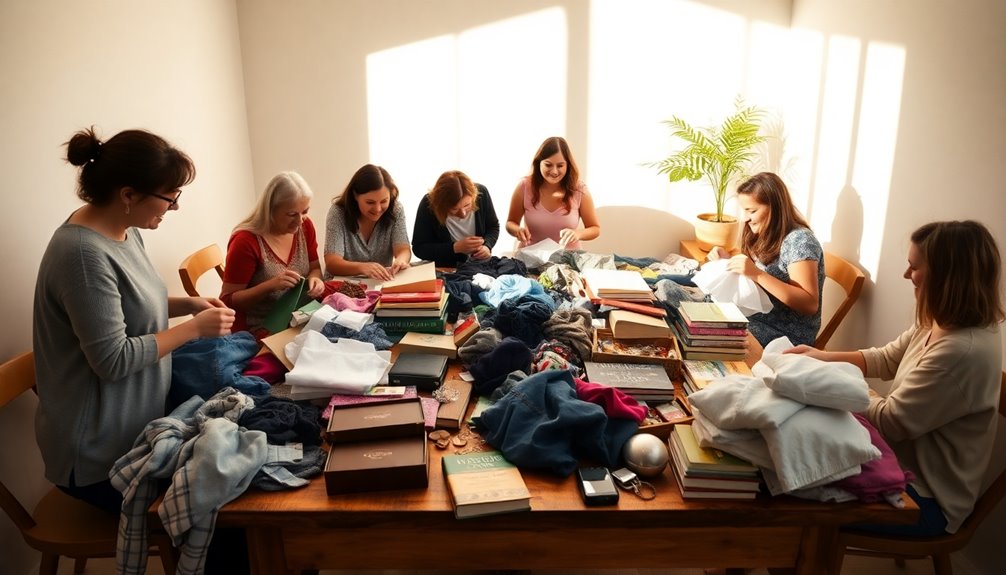
How can you make your decluttering journey more enjoyable and effective? By creating a support network! Engaging with online communities dedicated to minimalism, like forums and social media groups, offers you encouragement from like-minded individuals.
You'll gain insights and strategies from reading blogs and books focused on simplifying your life. Watching documentaries about minimalism can inspire you by showcasing real-life benefits of living with less.
Establishing connections with friends or family who value minimalism fosters an environment for shared experiences and tips. Additionally, joining local or virtual decluttering workshops provides structured guidance and accountability, making the process more manageable.
Incorporating mindful decluttering strategies can also enhance your experience by promoting a sustainable approach to your possessions.
Together, these connections can enhance your decluttering journey and help you embrace a minimalist lifestyle.
Practical Steps to Start Decluttering
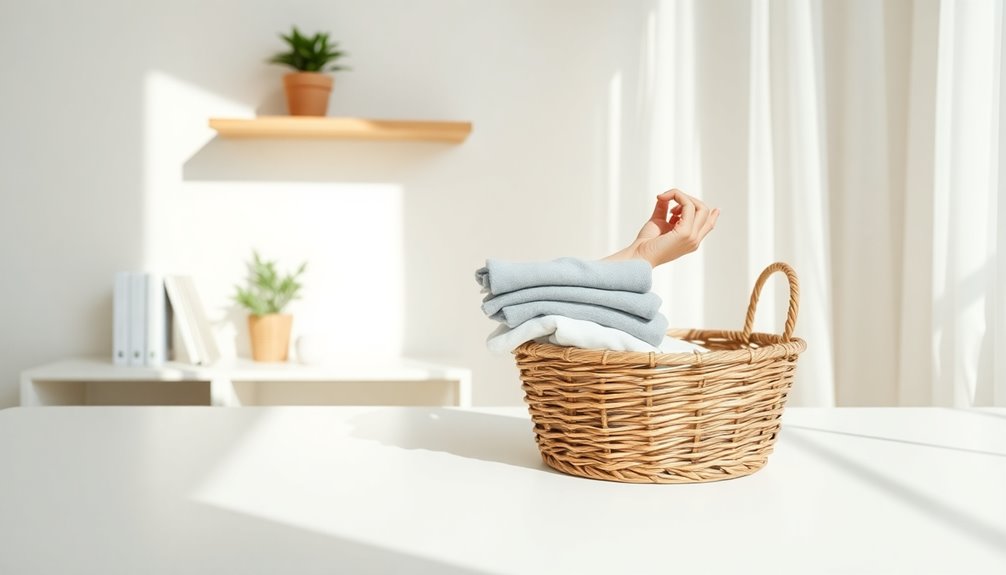
Ready to commence on your decluttering journey? Start by designating a box for unwanted items and aim to fill it with at least five items daily. You could remove 150 items in a month! Focus on small, manageable areas like a bathroom or closet to make quick decisions.
| Step | Action |
|---|---|
| Set a Timer | 15-30 minutes |
| Categorize | Clothes, Books, etc. |
| One In, One Out | Maintain balance |
Break the process down step by step, and don't forget the "one in, one out" rule to keep your space free of excess stuff. Remember, decluttering takes time, so embrace small steps to achieve less stuff. You may also find it helpful to incorporate essential oils for stress relief during your decluttering sessions to create a calming environment.
Celebrating Your Progress
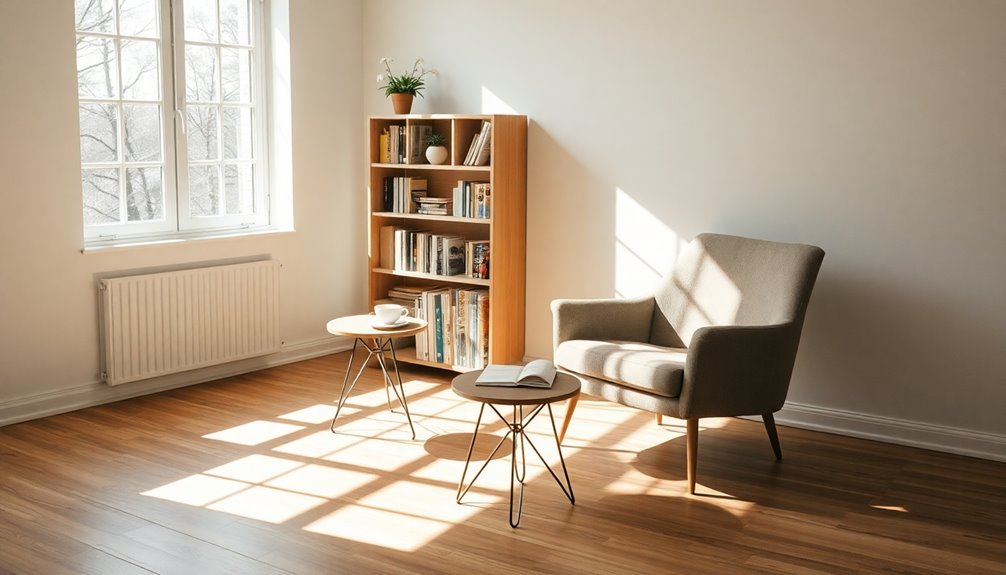
Celebrating your progress in decluttering can ignite a sense of accomplishment and motivation. By recognizing your achievements, you reinforce the habit of minimalism and inspire continued efforts.
Celebrating decluttering progress fosters motivation and strengthens your commitment to minimalism. Recognize your achievements and inspire ongoing efforts.
- Take photos to create a visual record of your decluttering progress.
- Reflect on improvements like reduced stress and increased clarity.
- Share your successes with friends or online communities for accountability.
- Establish personal milestones, such as finishing a specific room.
- Celebrate small wins, like organizing a single drawer or donating items.
These practices not only highlight your journey but also deepen your appreciation for the changes you've made. Additionally, embracing mindful decluttering can enhance your overall sense of well-being and sustainability.
Embrace each milestone, and let it fuel your commitment to living with less.
Frequently Asked Questions
What Is the 50% Rule in Decluttering?
The 50% Rule in decluttering means that whenever you bring a new item into your home, you should let go of at least 50% of similar items you already own.
This principle encourages you to think critically about your possessions, helping you maintain balance and reduce clutter.
What Is the 20/20/20 Rule for Decluttering?
Imagine your space as a calm ocean, free of debris.
The 20/20/20 rule helps you navigate clutter by suggesting that if an item costs under $20 and you can replace it within 20 minutes, you might as well let it go.
This simple guideline makes it easier to part with things that don't hold significant value, allowing you to prioritize space and organization over the fear of what you might need later.
How Do You Declutter and Live With Less?
To declutter and live with less, start by evaluating what you truly need.
Go room by room, focusing on small areas first to avoid feeling overwhelmed.
Use the "one in, one out" rule—when you buy something new, let go of something old.
Regularly review your belongings, keeping only those that serve a purpose or spark joy.
Celebrate your progress along the way; each small victory motivates you to continue your journey toward simplicity.
What Is the 12-12-12 Rule for Decluttering?
The 12-12-12 rule is a simple yet effective method for tackling clutter. You find 12 items to throw away, 12 to donate, and 12 to relocate.
This process encourages quick decision-making, helping you feel less overwhelmed. Completing this in one session provides a sense of accomplishment as you visibly see your progress.
You can adapt the numbers based on your needs, making it a flexible strategy for maintaining an organized space over time.
Conclusion
As you stand amid the chaos of clutter, remember that freedom lies in simplicity. Embrace the contrast between a cluttered space and a serene home, where each item holds meaning. By letting go of the excess, you invite clarity and joy into your life. Celebrate every small victory, for each step towards minimalism is a step towards a more fulfilling existence. With less weighing you down, you'll find more room for what truly matters—your peace, creativity, and happiness.
